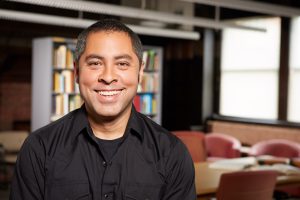Jason De Leon: Sharing the Stories of Migrants
In an attempt to understand undocumented migration, Jason De Leon is leading a research project with a unique approach that explores various elements of a complicated dynamic.
De Leon, professor of anthropology at the University of Michigan, is applying anthropology, forensic science, photography and archaeological tools to study migration along the U.S.-Mexico border in the Undocumented Migration Project.
“One of the problems is that people don’t necessarily have a nuanced understanding of what it actually means to be a border crosser or what it is actually like,” De Leon said. “This project is really an attempt to show (sic) people, ‘look it is a very complex thing that has a lot of moving pieces to it.’”
The Texas native grew up along the U.S.-Mexico border and the Rio Grande Valley before moving to Long Beach, California.
He grew up surrounded by the topic of undocumented migration and border crossing, having had undocumented family members from both his mother’s and father’s side, but did not imagine he would study this social phenomenon as a trained archeologist.
De Leon holds a doctorate degree in anthropology from Penn State University and earned his bachelor’s degree in anthropology from the University of California in Los Angeles.
For De Leon, the interest in studying undocumented migration grew while he was completing research in Mexico where he began to learn more about the stories of undocumented migrants and the often traumatic experiences they face while attempting to cross the border.
Undocumented Migration Project consists of applying different sciences and archaeological skills to study the sites migrants go through and the items they leave behind and treating those items as object of historical value.
He works with students in the Arizona desert and Chiapas, Mexico, to find objects, interview migrants and document the stories of those who have crossed the border.
De Leon said that often the stories of migrants like those of European migrants who arrived in Ellis Island, an immigration station in New York, in the late 1800s who suffered discrimination, exploitation, and mistreatment, are romanticized years later.
He does not find undocumented migration romantic.
“This project is to say, ‘look there’s nothing romantic about the immigration experience because it is so difficult,’” De Leon said. “People are migrating because they’re trying to improve their lives and they are coming from very difficult situations and potentially going into more difficult situations.”
He said with this project he wanted to show the importance of those experiences and demonstrate that Latinos have a history that is a part of American history especially with the “demonizing” of Latinos from the current president of the United States.
“In this political climate, we need people to feel that their stories are important,” De Leon said.
Stories, which he says, some immigrants choose not to share with close ones.
He admits that even as a Latino he had a simplistic understanding of undocumented migration and border crossing but the Undocumented Migration Project has allowed him to explore those stories and share them with others.
Forensic science is also used to understand what happens to the people who die in the desert.
“We’re trying to use as many tools as possible to improve our understanding of all of the things that go into this social process,” De Leon said.
De Leon was recently named a 2017 MacArthur Fellow recipient by the independent organization for his work but he said it is not only a recognition of the work but of the value of the stories.
“It’s not my job to make people love or hate immigrants because I think that is something that you have in your heart most of the time,” De Leon said. “Really we wanted to give people some more information so that they understand what (undocumented migration) really means.”







